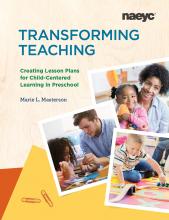Transforming Teaching: Creating Lesson Plans for Child-Centered Learning in Preschool

About the Book
- Real-life examples showing what is possible when teachers work together to enrich and personalize teaching
- Links to early learning guidelines and standards to maximize planning and communication
- Ideas for dramatic play themes that relate to daily life, families, cultures, and communities
- Strategies to infuse rich vocabulary experiences that scaffold language development, support executive function skills, and strengthen self-regulation
- Tips to help you evaluate and adapt spaces and materials to address physical needs
- Examples for how to support dual language learners
- Ways to integrate family engagement as a strength and asset for development and learning
Table of Contents
- Introduction
-
Chapter 1: Setting a Foundation for Teaching
- Celebrating How Children Learn
- Tips for Teaching: Learning by Observing
- Helping Children Thrive with Developmentally Appropriate Practice
- Balance Points: Using Reflective Practice
- Connecting Teaching to Children’s Lives
- Individualized Teaching: Using a Strengths-Based Approach
- Ready Resources: Exploring Your Community Context
- Understanding the Role of Play in Development
- Teaching with Children in Mind
- Helpful Hint: Following the Children’s Lead
- Research Connections: Strategies for Inclusion
- Exploring Elements of Child-Centered Teaching
- Sample Lesson Plans: Planning a Child-Centered Daily Schedule
- Links to NAEYC Early Learning Program Accreditation Standards and Assessment Items
- Reflection Questions
-
Chapter 2: Making Lesson Planning Work for You
- Engaging Children in Active Learning
- Balance Points: Positive Communication with Children
- Planning a Variety of Teaching Contexts
- Tips for Teaching: Creating a Rich Context for Learning
- Individualized Teaching: Planning Personal Conversation
- Exploring Levels of Support in Child-Centered Teaching
- Ready Resources: Exploring Emergent Curriculum
- Tips for Teaching: Effective Strategies to Support Child-Centered Learning
- Helpful Hint: Adding Teaching Strategies to Lesson Planning
- Being Consistent While Staying Flexible
- Tips for Teaching: Getting Organized and Staying Inspired
- Research Connections: Increasing Opportunities for Learning
- Helpful Hint: Planning Materials for Play
- Sample Lesson Plans: Planning Thematic Play Experiences
- Links to NAEYC Early Learning Program Accreditation Standards and Assessment Items
- Reflection Questions
-
Chapter 3: Preparing Child-Centered Themes and Play Areas
- Identifying Learning Goals for Play
- Recognizing Interdependence Among Areas of Development and Learning
- Supporting Emerging Skills and Dispositions
- Ready Resources: Exploring Standards and Early Learning Guidelines
- Digging Deeper with Content Skills for Child-Centered Teaching
- Helpful Hint: Considering the What, How, and Where of Play Areas
- Research Connections: Creating Active Learners
- Fostering Language Development During Play
- Tips for Teaching: Maximizing Language Support
- Helpful Hint: Making Play More Complex
- Balance Points: Planning Effective Behavior Guidance During Play
- Providing a Rich Context for Multilingual Learning
- Ready Resources: Strategies for Multilingual Learners
- Using Individualized Support
- Tips for Teaching: Supporting Children with Special Needs
- Ready Resources: Key Components of Inclusive Programs
- Sample Lesson Plans: Connecting Learning Across Content Areas
- Sample Book Lists: Aiming for Big Ideas and Concepts
- Links to NAEYC Early Learning Program Accreditation Standards and Assessment Items
- Reflection Questions
-
Chapter 4: Planning Teacher-Directed Activities
- Introducing New Information
- Tips for Teaching: Connecting to Children’s Daily Lives
- Engaging Children in Higher-Level Thinking
- Tips for Teaching: Choosing a Method and Activity
- Following a Sequence of Planning
- Tips for Teaching: Infusing the Joy of Writing
- Research Connections: Creating a Rich Contact Zone for Learning
- Teaching Children with Special Needs
- Individualized Teaching: Writing Personalized Supports
- Making the Most of Learning Objectives
- Helpful Hint: Being Proactive
- Ready Resources: Maximizing Vocabulary in Content Areas
- Sample Lesson Plans: Teacher-Directed Learning
- Links to NAEYC Early Learning Program Accreditation Standards and Assessment Items
- Reflection Questions
-
Chapter 5: Using Observation, Documentation, and Assessment to Guide Teaching
- Understanding Assessment with Young Children
- Tips for Teaching: Exploring and Using Data
- Understanding the Assessment Cycle
- Research Connections: Identifying Equity Issues
- Benefiting from Authentic Assessment
- Exploring Types of Authentic Assessment
- Assessing and Supporting Children Who Are Linguistically Diverse
- Balance Points: Seeing from the Child’s Point of View
- Ready Resources: Building on Developmental Milestones
- Ready Resources: Understanding Early Screening and Intervention
- Helpful Hint: Sharing Assessment Information with Families
- Committing to Ethical Practice
- Links to NAEYC Early Learning Program Accreditation Standards and Assessment Items
- Reflection Questions
-
Chapter 6: Enriching Communication with Families and Colleagues
- Planning and Communication as Anchors of High Quality
- Research Connections: Strengthening Teaching with Family Engagement
- Sharing Information Using Strengths-Based Language
- Tips for Teaching: Foundations for Integrating Culture
- Ready Resources: Ensuring Equity and Opportunity
- Enjoying Relationship-Based Teaching and Learning
- Tips for Teaching: Communicating with Colleagues
- Setting Goals, Establishing Priorities, and Sharing Progress
- Balance Points: Self-Regulation and Behavior
- Building Family Engagement Using Lesson Plans
- Helpful Hint: Strategies for Positive Impact
- Ready Resources: Family Engagement for Successful Teaching
- Sample Lesson Plans: Family Interview Questions
- Links to NAEYC Early Learning Program Accreditation Standards and Assessment Items
- Reflection Questions
- References
- About the Author
- Index
Book Details
ISBN: 978-1-938113-83-3
Publish Date: 2021
Related Resources
Articles
"The Power of Knowledge to Transform Teaching and Learning" - In this article, Adrienne Williams discusses her journey to adopting a knowledge-based curriculum and how it supports students in the growth of their knowledge, skills, and identities as readers, writers, and learners. (Young Children, December 2020)
"Quick and Easy Notes: Practical Strategies for Busy Teachers" - Celeste C. Bates, Stephanie Madison Schenck, and Hayley J. Hoover share strategies to develop a system for taking useful notes that ground teaching decisions and enrich children’s portfolios with examples of their everyday learning. (TeachingYoung Children, October/November 2019)
"Observing, Planning, Guiding: How an Intentional Teacher Meets Standards through Play" - Tackling the misperception that a rigorous, standards-based kindergarten cannot also be a child-directed, play-based kindergarten, Patricia McDonald shows how developmentally appropriate practice accomplishes academic rigor through play. (Young Children, March 2018)
Marie Masterson, PhD, is the director of quality assessment at the McCormick Center for Early Childhood Leadership. She holds a doctorate in early childhood education, is a licensed teacher, and is a national speaker, child behavior expert, and author of multiple books and articles that address research-based, practical skills for behavior guidance, high-quality teaching, family child care, leadership, and parenting. Marie provides content expertise and consultation to organizations involved in quality improvement and leadership development.

Reviews
Masterson’s instructive book explores all facets of preschool lesson planning to energize intentional teaching, bridging the dichotomy between teacher and child-centered curriculum. Full of useful classroom examples and complete lesson plan samples, this book addresses planning for all developmental domains, all learner types, and all modes of child activity.
—Michael Haslip, Assistant Professor of Early Childhood Education, Drexel University
This book encourages early childhood educators to deepen their teaching practice. It offers practical and applicable strategies to intentionally develop lesson plans that are culturally, linguistically, and developmentally responsive and to provide high-quality classroom learning experiences where “children recognize their experiences in the curriculum, materials, and activities.”
Dr. Masterson is an educator of educators and is an important voice in providing professional learning for the field of early childhood education and has written an anchor text for teachers and administrators, at all levels of their development, to build classrooms “for children to engage with peers and adults in meaningful learning throughout each day.”
—Emily Simon, P-2 Manager, Chicago Public Schools
I believe hands-on exploration is a major component in the early years. This book will be a great asset to educators everywhere. The examples of emergent teaching, individualized teaching, and teaching children with disabilities are great resources for assistant teachers.
—Hope Cain, Associate Teacher, NASA Goddard Child Development Center
